Now, I’m delighted to report, our first five schools have just opened in Madagascar and one of these (as the vibrant photo below shows) is on the same area of sand I was standing on earlier this year in Ampandrivotse.
Our five schools have been built in the Andavadoaka region, an isolated coastal area where the Vezu (‘paddler’) tribe have lived on a diet of fish, seaweed and sea cucumber for hundreds of years. Their livelihood is now threatened by the joint effects of climate change and off-shore ‘industrial’ fishing. To make matters worse there are very few schools, there is a shortage of teachers and very little infrastructure to train and support teachers. Due to these challenges, neither the government nor other NGOs have ever attempted to establish formal education across this region.
At UWS we believe that the best way to break this vicious cycle of poverty - even in the most remote and marginalised communities - lies in the provision of education and we have developed a pioneering approach that overcomes the challenges.
- We build schools in partnership with the local community
- We establish a local 'School Support Committee' to run the school
- We recruit and train local people to be our 'Community Teachers'
- We set up an 'Administration, Training and Resource Centre' (ATR) for every 25 schools that we build. The ATRs support the development of teachers and schools and enhance the capacity of the local education authority to ensure quality provision.
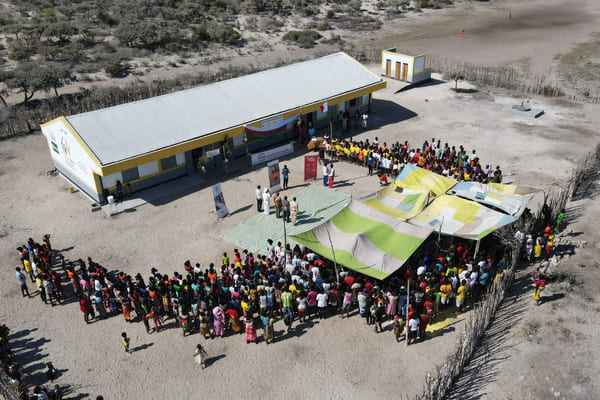
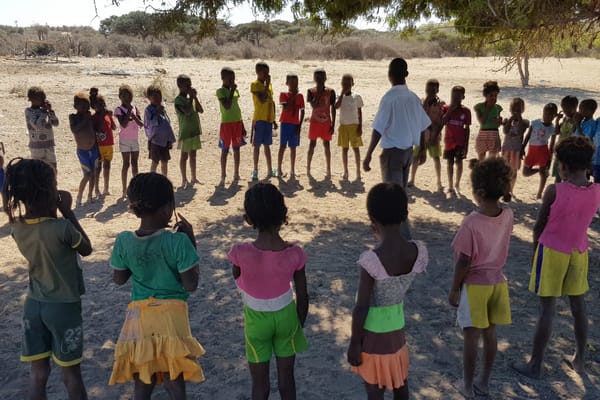
In Andavadoaka, over the next eighteen months, we will build a further 20 schools and the ATR to complete the first UWS Madagascar ‘Hub’. After a five year development programme, responsibility for all these schools and the ATR will transition to the local communities and the state education system, ensuring their long term sustainability.
Our goal in Madagascar is to build 200+ schools (8 ‘Hubs’ with ATRs), train 500+ Community Teachers and enrol 80,000+ ‘out of school children’.
We began this venture in partnership with the Axian Foundation and Blue Ventures and have recently formalised additional partnerships with the Ministry of Education and UNICEF. The combination of our global knowledge and expertise in running development education programmes and the national and local knowledge and expertise of our partners, gives us confidence that this programme will be successful.
But our ambition does not end there - we believe that through ‘sector influence’ and the scale up of the UWS Madagascar model, we can bring education to remote and marginalised communities across sub-Saharan Africa. Thank you for your ongoing support for this programme and for our programmes in Cambodia, Nepal and Myanmar. Over the last ten years over 49,000 children have experienced the joys of going to school thanks to UWS.
In addition to operating at scale, we focus on ensuring quality, inclusion and sustainability in all we do. We are a low cost and high impact charity, pioneering new practices and transforming the lives of current and future generations in some of the world’s poorest regions. We are efficient and effective and we stand up to the scrutiny placed on modern charities through our sustainable and community-led practices.
Through your generosity we are able to bring hope and the prospect of a brighter future, to children in communities such as Ampandrivotse. Thank you.
GIRLS WILL BE
WHATEVER THEY WANT TO BE
Almost half the countries around the world have still not reached gender parity in the classroom. When families can only send one child to school, often it’s a son who is chosen.
Even when they are able to get to school, girls are being held back in the classroom by damaging gender stereotypes – told they can’t be too outspoken, too ambitious or too independent. All because they’re a girl.
Girls from remote, ethnic minority communities are disproportionately affected. The girls who do attend school are at higher risk of dropping out by the time they reach their teens, due to the risk of child marriage and social stigma surrounding menstruation.
“I am proud that with education, my daughter can choose what she wants to become in the future.”
Jayanti, Nepal, Mother and Farmer
Make a gift to United World Schools and you could help over 10,000 girls in Cambodia, Nepal, Myanmar and Madagascar get access to education.
Your donation could help our incredible local teams to build schools in remote areas, improve hygiene facilities and train teachers in casting out gender stereotypes in the classroom. Your support could fund Mothers and Girls Groups so that girls are supported by their community and equipped with the skills and confidence they need to go to school with their head held high – and the conviction to take on the world.
The time for action is now. Because if you make your gift today, it will be doubled by the UK government. Your powerful support could help girls get access to education they would otherwise have been denied – access that their mothers and grandmothers never had.
Education helps girls to understand their rights.
- Tev, Community Teacher, Cambodia
Educating girls is proven to be one of the most powerful ways to change the world; it empowers them to break gender barriers, earn more, marry later and have a positive ripple effect on communities, future generations and even the environment.
According to the UN, for every additional year of primary school, a girl is likely to earn 10-20% more when they grow up. Not only that, but they’re likely to challenge outdated gendered expectations such as child marriage by choosing to marry later. Studies even show that educating girls is one of the most powerful ways to combat the climate crisis.
And if they choose to become mothers one day, the chances of their children surviving past the age of 5 increases, and they’ll be much more likely to push to educate their own children. This will create a powerful ripple effect, breaking the cycle of poverty and bringing our world closer to the day when no girl is restricted by the circumstance of her birth. It all starts with them – and with you.
Your donation will be doubled by the UK government.
Together, our impact could be limitless.
COBIS supports charitable and not-for-profit organisations who share a passion for, and commitment to, helping schools and pupils thrive around the world. We are delighted to have been recognised by COBIS, and their support will help us reach more children in remote communities with a life-changing education.
UWS has worked in partnership with a number of COBIS schools for many years. We have well-established relationships with the British School of Paris, British School in Tokyo, British School of Bahrain, Dubai College, GEMS Jumeriah Primary School, GEMS Wellington International School, and Dubai English Speaking School and College. During this time, these brilliant schools have helped us raise vital funds, given their time and raised awareness, to provide life-changing education in Nepal and Cambodia. These impactful partnerships have established and maintained schools in some of the most remote regions of Asia, providing education to over 1,000 children. We are so pleased to have established a partnership with COBIS, and the 450 schools and organisations who make up their global membership.
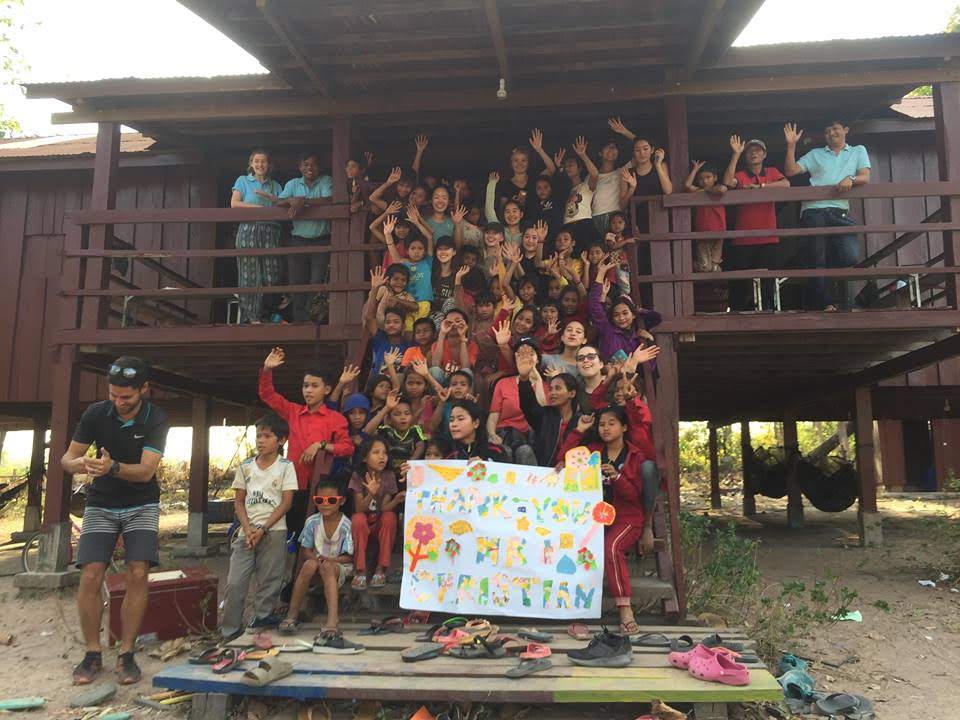
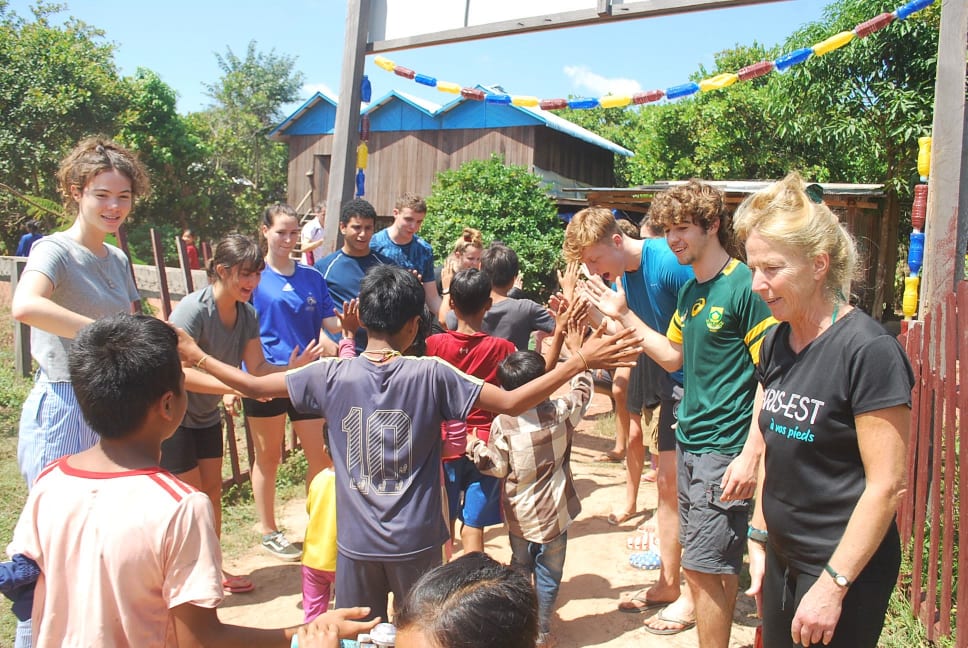
"We would like to thank everyone at COBIS for choosing to partner with United World Schools, and mobilise their global community of students and educators to make change happen. This partnership is an invaluable opportunity to champion the power of education, and transform the lives of some of the world’s most disadvantaged children.’’
- Tim Howarth, CEO
This partnership is truly global in its scope. High-quality COBIS schools, which educate over 165,000 students and employ more than 16,000 teachers, can be found in 76 countries across Europe, Asia, Africa, the Middle East and the Americas. Together, we will share the transformational power of education with every member of the COBIS community. Not only this, but our partnership will stretch across COBIS’ influential networks within global education, helping us to reach new audiences, and raise vital funds and awareness for our work. Throughout the journey of our partnership, UWS will support the COBIS school network with promotional materials for global learning in the classroom, giving young learners the opportunity to think critically about important issues in the world.
This partnership comes at an exciting time for us at UWS, as we reach new communities in Madagascar with our pilot project, and continue to reach new communities across Nepal, Cambodia and Myanmar. We look forward to sharing the impact of this partnership over the course of the next academic year!
Throughout the COVID-19 pandemic, our teams across Cambodia, Nepal and Myanmar remained resilient in the face of unprecedented circumstances. Not only this, we innovatively pivoted our education techniques to continue reaching children in remote communities with our award-winning model of quality, inclusive education. Despite the challenges of the past 18 months, we continued growing for the 12th consecutive year, increasing our reach to more than 43,000 children, 1,200 teachers, and 250 schools.
Despite this progress, we are ever mindful that 258 million children remain out of school globally - and that the pandemic has had a devastating impact on a decade of collective progress in reducing those numbers. At United World Schools (UWS), we are committed to ending the global education crisis and transforming children's lives through our approach to universal education access. As part of our UWS-2030 vision, our goal over the next decade is to reach 250,000 primary school aged children with education. In support of this, we are delighted to announce the launch of a pilot project in Madagascar.
In partnership with Blue Ventures, an award winning conservation charity which aims to holistically transform communities, and the Axian Foundation, we are launching a ground-breaking partnership. This partnership will transform the lives of thousands of children across southwest Madagascar.
Madagascar remains one of the poorest countries in the world; a staggering 75% of the population live below the poverty line and only 40% of children finish primary education. In remote and coastal areas, which have traditionally been difficult to access for other NGOs, there is limited support and little access to basic infrastructure including education. Our speciality is accessing these communities where others cannot. Research from our partner Blue Ventures indicates that between 40-50% of children are out of school in the coastal southwestern regions of Madagascar.
We are launching a pilot project, where we will construct five schools in the remote communities of Andavadoaka, a fishing village located in Madagascar’s Velondriake region on the southwest coast of Madagascar. Here, the lack of access to education is significantly higher than the majority of the country; only 1 in 3 children in the Velondriake area currently have access to a classroom. Of the children currently in school, most do not make it beyond primary level and girls are likely to drop out at a young age. These schools will serve approximately 1,000 children.
"Blue Ventures is delighted to collaborate with United World Schools, an NGO specialising in education, facilitated by the financing of the Axian Foundation with whom we have a longstanding relationship.
- Peter Wilson, Country Director of Blue Ventures Madagascar
“This collaboration is great news for the thousands of children from the remote coastal communities in Madagascar who struggle to access education. Blue Ventures has been working with coastal communities around Madagascar for over 15 years. This initiative will support quality education for children opening up their futures to earn a living outside the immediate fisheries sector.”
Isabelle Salabert, Chief Executive from Axian Foundation, said: “Collaboration and sharing of expertise are at the heart of Axian Foundation’s operating model. Working hand in hand with internationally renowned NGO’s in the field of education and sustainable development such as United World Schools and Blue Venture is a unique opportunity for us and more importantly for the school children who will benefit from better learning conditions.”
We are so proud to be launching this project with Blue Ventures at the Axian Foundation, and we look forward to sharing the success of the pilot.
As the new variant of Covid-19 ravages through rural villages in Nepal, Amrita, Jenna and Nina are backing our appeal to raise urgent funds to support vital healthcare in the communities where UWS works, provide food and other essentials for vulnerable girls, deliver remote learning while schools are closed, and continue transforming children’s futures through education once the pandemic is over.
The three actors are putting a spotlight on the challenges of getting girls into school and staying in education by sharing their real-life stories with films; Heena* and Soneeya* (voiced by Amrita Acharia) Chimini* (voiced by Jenna Coleman) and Preeti* (voiced by Nina Wadia). The girls all live in hard to reach villages, high in the Himalayas in Nepal, where only a third of children complete even a basic education and thousands have never had a chance to go to school.
Prior to Covid-19, 130 million girls worldwide were already out of school and, in the poor and marginalised communities where children have no access to Zoom or technology, getting access to education is now almost impossible. School closures amid the pandemic have resulted in a loss of learning for millions of children and compounded the already dire progress on the global commitment to guaranteeing a quality education for every child by 2030.

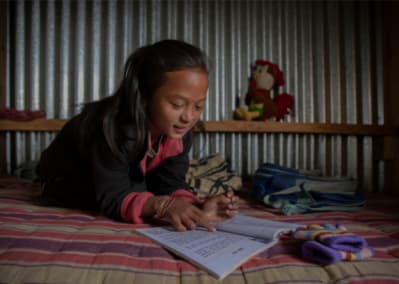
“My early childhood was spent in Kathmandu and Bharawa, where some of my fondest memories and
- Actor Amrita Acharia
The entire world has been affected by Covid, but it is particularly distressing to hear how the new variant of Covid-19 is devastating people’s lives there right now, especially with family still living there. The situation is terrifying but starting to abate. For those living in rural areas, the tragedy is starting to unfold.
I voice the stories of Heena and Soneeya – two sisters who have never been to school and dream of what it might feel like to wear a school uniform and sit in a classroom. In the beautiful, but highly inaccessible region where they live, schools can be a long and dangerous journey away and families often need the girls to stay at home to help with chores or to work in the fields.”
“Tragically, the global pandemic means that their chance of getting an education is now even further out of reach – and progress globally in getting children into school is likely to reverse by a decade. United World Schools is now even more determined to reach children in the world’s most remote places with life-changing education. Please join me in helping Heena and Soneeya achieve their dreams.”
“It is deeply shocking to know that even before Covid, 130 million girls were out of school. And it’s still girls that are missing out most on education, leaving them extremely vulnerable to exploitation and early marriage."
- Actor Jenna Coleman
“I was humbled to hear about Chimini and her desperation to go to school; how she longs to learn to read and write and wants to understand everything. By adding my voice to Chimini’s story, I hope that many more people will get an insight into the situation faced by millions of girls around the world who, without being able to go to school, have no chance to unlock their potential and build a brighter future. By supporting the Happily Ever Smarter appeal we can give Chimini and thousands of other children a chance to create a better life, beyond poverty. Every girl deserves a right to an education.”
“I narrate the story of Preeti and it’s incredible to learn that she is the very first girl in her family to go to school. She dreams of one day becoming a doctor and helping her community."
- Actor Nina Wadia
“However, for girls like Preeti, the opportunity to get an education is still very fragile and Covid-19 is now threatening her chance to stay in school. There is a real fear that post the pandemic the habit of education will be broken and millions of girls won’t return to school.”
“United World Schools is doing some great work to keep education alive by delivering learning packs and transmitting lessons over the radio to thousands of children. Right now, United World Schools’ support is more important than ever before.”
Together, we’re calling for urgent support for children living in some of the world’s poorest and most marginalised communities, as Covid-19 threatens to reverse progress on global education by a decade.
Join Amrita, Jenna and Nina in supporting education at this crucial time; donate to our Happily Ever Smarter appeal today and transform a child’s future forever.
Media Contact: Karen Garvin, 07971 576917
United World Schools (UWS), has today teamed up with some of the UK’s most loved children’s illustrators to launch the Happily Ever Smarter Secret Sale. Axel Scheffler [The Gruffalo], Debi Gliori [The Trouble with Dragons], Emma Chichester-Clark [Blue Kangaroo], Emily Gravett [Wolves], Guy Parker-Rees [Giraffes Can’t Dance] Jackie Morris [The Snow Leopard] and Burmese-born Ohn Mar Win, have all created beautiful illustrations to bring the transformative power of education to life. By adding their artwork to the Secret Sale they aim to help children living in some of the world’s most remote communities realise their dreams of going to school, as Covid-19 threatens to reverse progress on global education by a decade.
The Secret Sale, which runs until midnight on 28 July, gives ticket holders a chance to win beautiful original artwork by the above illustrators. Runner-up ticket holders may win a drawing from a child at a UWS school in Nepal depicting their ‘dreams for their future’. Funds raised from the Secret Sale will help thousands of children in some of the world’s poorest and most marginalised villages to access quality education, for the very first time.
The illustrators contributing to the Secret Sale have used their talent to tell the big stories of some of the bright, strong and determined children UWS is working to support in Nepal in small packages, including Heena, Preeti, and Chimini (image galleries, quotes and case studies available through links). Some of these children have never been to school and others are determined to continue despite enormous obstacles.
Globally, prior to the pandemic, 1 in 6 children were missing out on the chance to have an education (UNESCO) and in the remote regions of Asia where UWS works, only a third of children complete even a basic primary education.
Right now, in Nepal, the new Covid-19 variant has closed schools and is threatening the lives of children and their families. UWS is providing a lifeline to remote communities by supporting health services, providing food, vital items and remote learning. Working in collaboration with radio stations across Nepal, UWS is teaching thousands of children by transmitting radio lessons and providing take-away packs during lockdown to help keep the habit of education alive.
Axel Scheffler is an award winning, internationally acclaimed illustrator of some of the most well-loved children’s books such as The Gruffalo. His books have been published in many languages and he has exhibited all around the world.
Axel said: “Preeti is the very first girl in her family to go to school and education is still new and fragile in her community. Covid is now threatening the chance for children in these remote villages to get even a primary education. I hope that this collection of illustrations and the Secret Sale helps bring education to thousands more children who deserve a chance to learn and to grow.”
Jackie Morris, writer and illustrator, won the Kate Greenaway Medal in 2019 for her illustration of The Lost Words, voted the most beautiful book of 2016 by UK booksellers. Jackie, whose illustration is entitled ‘Because education opens doors to dreams’ said: “I was inspired by Heena’s story. She’s ten, but has never been to school, lives in a remote village in Nepal.
“When I was a child I felt trapped in school, spent time drawing and dreaming, looking out of the window. Heena made me wonder what it might feel like to be trapped outside of school.
“Education opens up so many choices for us all. There are so many things a child might become, so I’ve tried to list a few, from being a scientist, and artist to an architect. Or perhaps a teacher in her own community. Education enriches everyone. It gives us choices, new paths to follow, empowerment.”
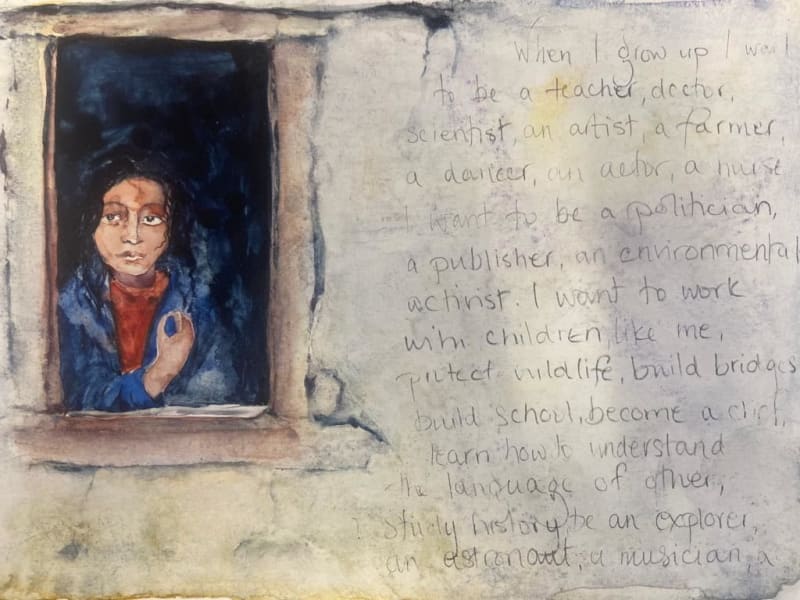
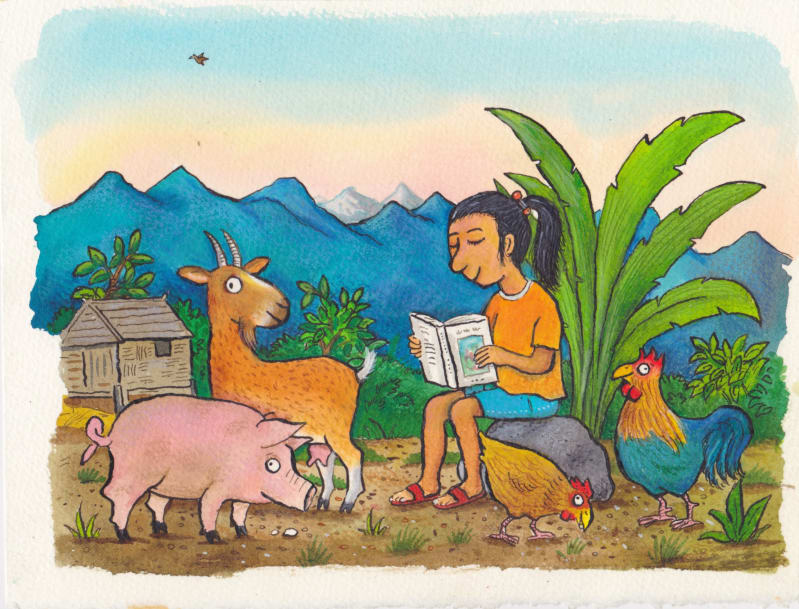
The Happily Ever Smarter campaign was launched on 29 April with a powerful animated film to tell the story of Kanchi, narrated by Amanda Redman. The campaign draws on the power of illustration, storytelling and animation to turn dreams into reality for thousands of children in the hardest to reach areas of Nepal, Cambodia and Myanmar.
Tim Howarth, CEO of UWS, said: “At UWS each day, we hear and see stories unfolding of children going to school for the first time, learning to read, write, and count, and see their dreams for the future become real. It’s been terrific to see how these brilliant children’s illustrators have been inspired by their stories and brought them to life in such a magical way. Together we can make an enormous impact on the future of thousands more children through life-changing education.”
The UK government is doubling all donations to UWS until 29 July, as part of its Aid Match campaign. This means that each ticket for the Secret Sale will support the training of one local person to become a community teacher in some of the most remote areas of Nepal, Cambodia and Myanmar. This provides new job opportunities within the community and ensures that education is sustainable, adaptive for the local languages spoken, and relevant to the community culture.
Buy your ticket now for the Secret Sale
Ends
Notes to Editors:
- For more information, spokespeople, imagery and data on global education please contact:
Karen Garvin [email protected] 07971 576917
- Images
- High resolution images of the illustrations can be downloaded here
- Chimini - selection of images and first person story
- Heena and Soneeya - selection of images and first person story
- Preeti - selection of images and first person story
Photo credit for Chimini, Heena, Soneeya and Preeti images: Navesh Chitrakar/UWS.
*All girls' names have been changed to protect their identity.
- The Happily Ever Smarter Secret Sale, runs from 7 July and ends midnight on 28 July, gives all ticket holders a chance to win a beautiful original artwork by one of the above renowned illustrators or a drawing from a child at a UWS school in Nepal depicting their ‘dreams for their future’. All original artworks by the illustrators are approximately A5 size. Funds raised from the Secret Sale will help thousands of children in some of the world’s poorest and most marginalised villages to access quality education, for the very first time.
- The campaign #HappilyEverSmarter runs from 29 April to 29 July 2021. All donations will help children from very remote communities access education in Nepal, Cambodia and Myanmar. It will also provide healthcare support, food, vital necessities and remote learning during the pandemic across all UWS’ education programmes.
- UK Aid Match campaign - From 29 April to 29 July 2021 for every £1 you give to United World Schools the UK government will match your donation by giving another £1. All donations will help children from very remote communities access education across Asia. UK government funding will go to UWS’ programmes in Nepal to help over 8,000 out-of-school children in some of the most remote regions go to primary school for the very first time. Donations from the British public will be spent across all UWS’ education programmes in Nepal, Cambodia and Myanmar.
- United World Schools (UWS) builds schools in some of the most remote, impoverished villages in the world and champions inclusive, innovative and sustainable education, including remote learning during the Covid-19 pandemic. Since 2008, UWS has built 250 schools and trained 1,000 local and government teachers and reached 43,000 children in Nepal, Myanmar and Cambodia with life-changing education. UWS is a 2019 WISE Award Winner for educational innovation, and a 2020 UNESCO King Sejong Literacy Prize winner for ethnic minority literacy programmes.
Media Contact: Karen Garvin, 07971 576917
Since launching eight weeks ago, Happily Ever Smarter, organised by United World Schools (UWS), has raised £1 million from the generous British public to provide life-changing education to children in some of the most remote communities in Asia. As the new variant of Covid-19 ravages through rural villages in Nepal, Amrita, Jenna and Nina are backing the appeal to raise urgent funds to support vital healthcare in the communities where UWS works, provide food and other essentials for vulnerable girls, deliver remote learning while schools are closed, and put finance in place to continue transforming children’s futures through education, once the pandemic is over.
The three actors are putting a spotlight on the challenges of getting girls into school and staying in education by sharing their real-life stories with films; Heena* and Soneeya* (voiced by Amrita Acharia) Chimini* (voiced by Jenna Coleman) and Preeti* (voiced by Nina Wadia). The girls all live in hard to reach villages, high in the Himalayas in Nepal, where only a third of children complete even a basic education and thousands have never had a chance to go to school.
Prior to Covid-19, 130 million girls worldwide were already out of school and, in the poor and marginalised communities where children have no access to Zoom or technology, getting access to education is now almost impossible. School closures amid the pandemic have resulted in a loss of learning for millions of children and compounded the already dire progress on the global commitment to guaranteeing a quality education for every child by 2030.
Actor Amrita Acharia, currently filming THE SERPENT QUEEN, said: “My early childhood was spent in Kathmandu and Bharawa, where some of my fondest memories and values are rooted. The entire world has been affected by Covid, but it is particularly distressing to hear how the new variant of Covid-19 is devastating people’s lives there right now, especially with family still living there. The situation is terrifying but starting to abate. For those living in rural areas, the tragedy is starting to unfold.
“I voice the stories of Heena and Soneeya – two sisters who have never been to school and dream of what it might feel like to wear a school uniform and sit in a classroom. In the beautiful, but highly inaccessible region where they live, schools can be a long and dangerous journey away and families often need the girls to stay at home to help with chores or to work in the fields.
“Tragically, the global pandemic means that their chance of getting an education is now even further out of reach - and progress globally in getting children into school is likely to reverse by a decade. United World Schools is now even more determined to reach children in the world’s most remote places with life-changing education. Please join me in helping Heena and Soneeya achieve their dreams.”
Actor Jenna Coleman said: “It is deeply shocking to know that even before Covid, 130 million girls were out of school. And it’s still girls that are missing out most on education, leaving them extremely vulnerable to exploitation and early marriage.
“I was humbled to hear about Chimini and her desperation to go to school; how she longs to learn to read and write and wants to understand everything. By adding my voice to Chimini’s story, I hope that many more people will get an insight into the situation faced by millions of girls around the world who, without being able to go to school, have no chance to unlock their potential and build a brighter future. By supporting the Happily Ever Smarter appeal we can give Chimini and thousands of other children a chance to create a better life, beyond poverty. Every girl deserves a right to an education.”
Nina Wadia, said: “I narrate the story of Preeti and it’s incredible to learn that she is the very first girl in her family to go to school. She dreams of one day becoming a doctor and helping her community. However, for girls like Preeti, the opportunity to get an education is still very fragile and Covid-19 is now threatening her chance to stay in school. There is a real fear that post the pandemic the habit of education will be broken and millions of girls won’t return to school.”
“United World Schools is doing some great work to keep education alive by delivering learning packs and transmitting lessons over the radio to thousands of children. Right now, United World Schools’ support is more important than ever before.”
Happily Ever Smarter was launched by actor Amanda Redman [New Tricks, At Home with the Braithwaites and Good Karma Hospital] on 29 April who shared the story of Kanchi with a powerful animated film.
Tim Howarth, CEO of UWS said: “Thanks to the fantastic generosity of the UK public, over £1 million has now been donated towards this vital appeal. We are enormously grateful to all of our supporters, including schools across the UK, who have so generously donated. The pandemic has shone a light on the inextricable link between education, wellbeing and healthcare, and so it has never been more crucial to support children, both girls and boys, in these remote and marginalised communities and ensure they live Happily Ever Smarter.
“We are thrilled to have Amrita, Jenna and Nina on board to help us highlight the urgency of the education crisis and ask you to please give as generously as you can, so that together we can transform the lives of thousands more children.”
Award winning charity United World Schools (UWS) develops schools in some of the most remote, impoverished villages in the world and champions inclusive, innovative and sustainable education. Right now, in response to this deadly Covid-19 virus UWS is providing a lifeline to hundreds of people at each school by supporting health services, providing food, and vital items and is keeping education alive with remote learning while schools are closed using radio lessons and take-away education packs.
Donations will help provide the following:
- £10 could provide a child in a remote area of Nepal with a radio to keep them learning through radio lessons.
- £35 could provide an at-risk girl and her family of 4 with food, sanitary pads and soap to last a month.
- £50 could train a local teacher in emergency response, Covid awareness and healthcare support.
- £80 could provide education for a year for one child.
#HappilyEverSmarter runs until 29 July 2021. To donate please visit www.unitedworldschools.org
Ends
Notes to Editors:
- For more information, spokespeople, imagery and data on global education please contact:
Karen Garvin [email protected] 07971 576917
- Images of Amrita Acharia Jenna Coleman and Nina Wadia
- To download and host films on your own platform:
Heena and Soneeya narrated by Amrita Acharia
Chimini narrated by Jenna Coleman
Preeti narrated by Nina Wadia
- Images and stories
Chimini - selection of images and first person story
Heena and Soneeya - selection of images and first person story
Heena and Soneeya - selection of images and first person storyPreeti - selection of images and first person story
Photo credit for Chimini, Heena, Soneeya and Preeti images: Navesh Chitrakar/UWS.
*All girls' names have been changed to protect their identity. - #HappilyEverSmarter runs from 29 April to 29 July 2021. All donations willhelp children from very remote communities access education in Nepal, Cambodia and Myanmar, as well as provide healthcare support, food, vital necessities and remote learning during the pandemic across all UWS’ education programmes.
- United World Schools (UWS) builds schools in some of the most remote, impoverished villages in the world and champions inclusive, innovative and sustainable education, including remote learning during the Covid-19 pandemic. Since 2008, UWS has built 250 schools and trained 1,000 local and government teachers and reached 43,000 children in Nepal, Myanmar and Cambodia with a life-changing education. UWS is a 2019 WISE Award Winner for educational innovation, and a 2020 UNESCO King Sejong Literacy Prize winner for ethnic minority literacy programmes.
Every child deserves to go to school, and every child deserves to be protected from abuse, harm, neglect and maltreatment. But an estimated 246 million children are harassed or abused on the way to, or at school, and disabled children are up to four times more likely to be subjected to violence and neglect (Keeping Children Safe, 2021, UNICEF). The spread of Covid-19 has introduced additional risks to children’s safety, and the ripple effects of the economic and social impacts of the pandemic are bringing up further child safeguarding risks (UNICEF 2021).
United World Schools recognises that it is our duty to protect children from abuse, harm, neglect or maltreatment. Just like in every community around the world, children face the risk of harm and abuse in communities we support. It’s our responsibility to recognise this risk, and to ensure that the protection of children is an integral part of our mission. It’s only through this, that we can achieve our goal of delivering safe, quality, inclusive education to communities.
As part of this commitment, we have recently received our Level 1 accreditation from Keeping Children Safe (KCS). We know that actions speak louder than words, and this accreditation shows everything that we do to keep children safe in every community we work in.
Keeping Children Safe is an independent non-governmental organisation who set out internationally recognised safeguarding standards. Their standards are recognised by the UK government (Foreign, Commonwealth and Development Office), the European Commission, the US government (USAID) and the United Nations.
The International Safeguarding Standards are based on the following set of guiding principles, which United World Schools supports:
- All children have equal rights to protection from harm
- Everyone has a responsibility to support the protection of children
- Organisations have a duty of care to the children with whom they work, are in contact with, or who are affected by their activities and operations
- If organisations work with partners they have a responsibility to help them to meet minimum requirements on child protection
- All actions on child safeguarding are taken in the best interests of the child, which are paramount
Our accreditation from KCS means that we have a robust, effective child safeguarding framework in place across United World Schools.
Over the course of June 2021, we will be sharing more information about our child protection policies and practices, and sharing the experiences of our teachers and students across the communities we support.
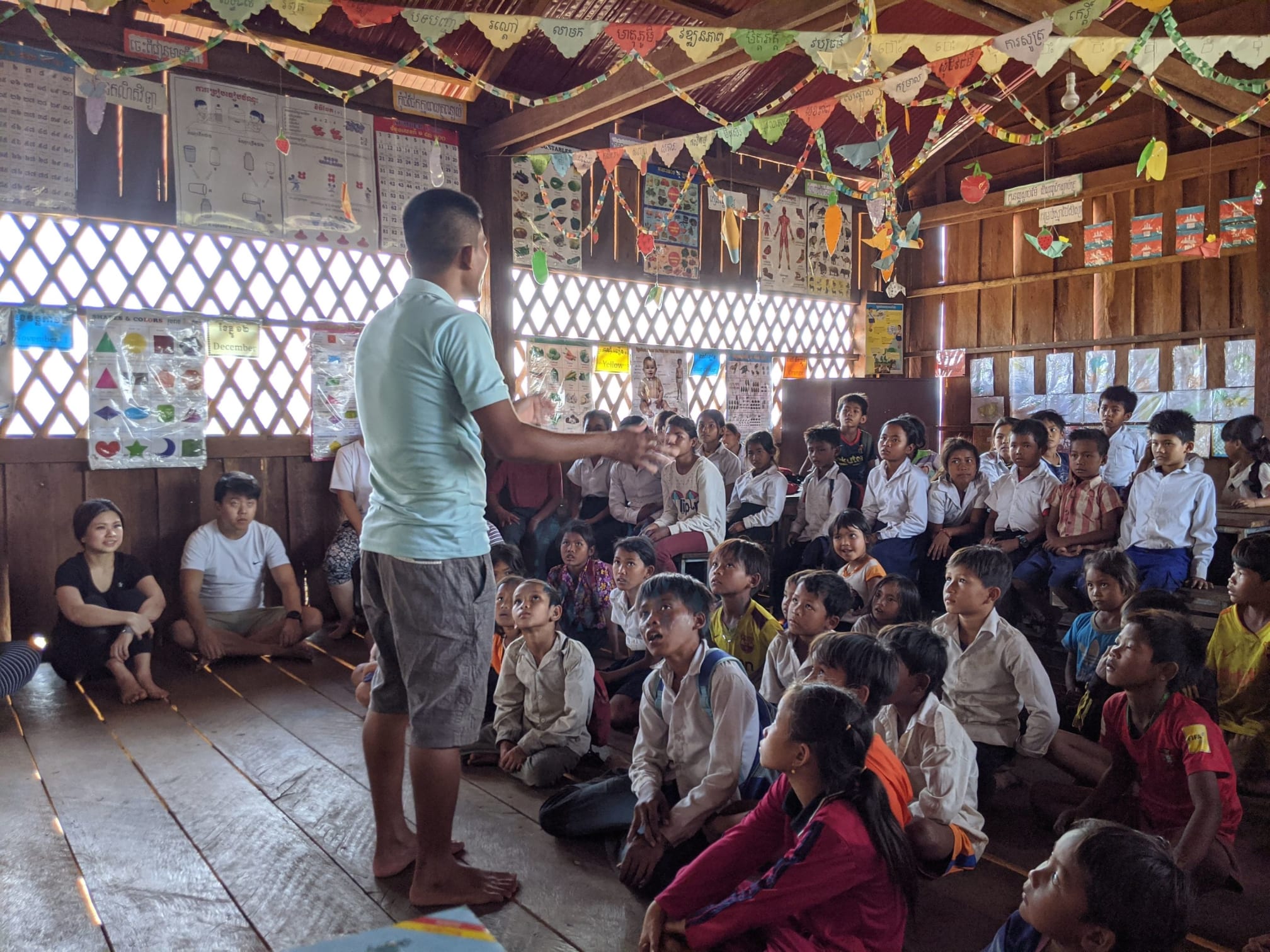

United World Schools believes that all children deserve safe, quality education. That’s why for the past 12 years we’ve been working in some of the world’s poorest regions, operating in remote communities to provide previously out-of-school children with access to primary education. Providing hard to reach girls with access to education has always been part of what we do, and is central to our mission to transform lives through education.
Across Cambodia, Myanmar and Nepal, we work with rural communities, who are often ethnic minorities, relying on subsistence farming with little support from the central government. Many of these communities have never had access to education, and opportunities for children and young people to live a more prosperous life than their parents, are few.
Girls in these communities face additional disadvantages. Many families are not familiar with the culture of formal education, and do not see the value in sending their daughters to school. Many girls are encouraged to marry early and start a family. After the onset of puberty and menstruation, many girls drop out of school, even if they had started attending, due to social taboos, inequitable learning environments and pressures to start a family. What’s more, it’s often unsafe for girls to travel long distances to and from school, due to the threat of gender-based violence.
Overcoming these barriers, and giving girls access to safe, quality education is central to our goal to reach 250,000 children with inclusive, quality education by 2030.
In order to ensure the education we provide is inclusive, we take a nuanced approach, recognising the multiple barriers that many of the children we work with face due to factors such as gender, disability, poverty, ethnicity and language. Inclusive education is central to our model. From the outset, we only work in communities that want a school and commit to sending both girls and boys, increasing the value attached to education by families and communities. Through our WASH facilities and safeguarding measures (for which we have just been accredited by Keeping Children Safe) we ensure the school environment is safe for girls and considers their needs. We hire and train community teachers who teach children in a language they understand (initially the local language) and use positive, child-centred teaching methods. We collect school data to improve school quality and to help us identify and support the children who are most at risk of dropping out.
Providing 40 million more girls with education will help empower a generation of girls to follow their dreams, achieve their goals, and lead change. We particularly welcome the focus on the most marginalised and vulnerable girls, who are the most at risk of being left behind, and who have already paid the highest price in terms of education as a result of Covid-19. All girls, including girls with disabilities, girls living in areas of conflict and crisis and ethnic minority girls should be given equitable access to education.
As UWS welcomes even more supporters to the UWS family each day, we also welcome significant financial commitments from G7 leaders to back up this pledge at a global level. The most marginalised girls will only be reached, and supported to access education, with significant financing of education initiatives including catch up initiatives, improved maths and literacy programmes, improved WASH facilities, nutrition programmes, and social protection. We will continue to work to deliver inclusive education, and to transform children’s lives.
Just ahead of launch, we spent some time discussing our plans with Amanda. Here’s what she shared about her deep connection with Nepal and the South Asia region, and motivations for supporting our campaign…
"I visited Nepal in 2015, just a few months after the earthquake which devastated the country. It broke my heart to see how the kind, hard working people I met had completely lost everything. We visited a very remote area where a school had been built, but this had been destroyed too and the children were crowded into tents trying to learn"
- Amanda Redman
In these remote areas, I saw how children so desperately want to get an education that they walk for hours along treacherous mountain paths to get to school, and then back again at the end of each day. I met one young mum, Sunita, whose home had been completely destroyed and they were sheltering in their chicken coup. She told me that all she wanted was for her two daughters to be educated so that they can have a better future.
It’s absolutely staggering to learn that even in 2021, one in six children worldwide don’t go to school. Visiting rural Nepal really brought home to me how vitally important education is, it really was eye-opening. We think having education is such a basic thing, and something that every child has a right to, but for so many it’s still a luxury.
The loss of learning, which has been exacerbated by Covid-19, has forced me to reflect on the children I met in Nepal following the earthquake in 2015… I’ve been an advocate for child rights for many years, so I was inspired to see what UWS are doing and how they are teaching marginalised children in some of the hardest to reach places in the world – and giving them the vitally important education they deserve.
I am honoured to be supporting Happily Ever Smarter and delighted to help share the story of Kanchi – one of the many strong and determined children UWS is helping to go to school for the first time. When I was invited to support this campaign I didn’t need to think twice; I’ve seen first-hand what people are up against and so I jumped at the chance to get involved. What United World Schools is achieving by working hand in hand with local communities in some of the most remote parts of the world is magnificent. I hope that together, we can give thousands more children a chance to have a brighter and more secure future.”
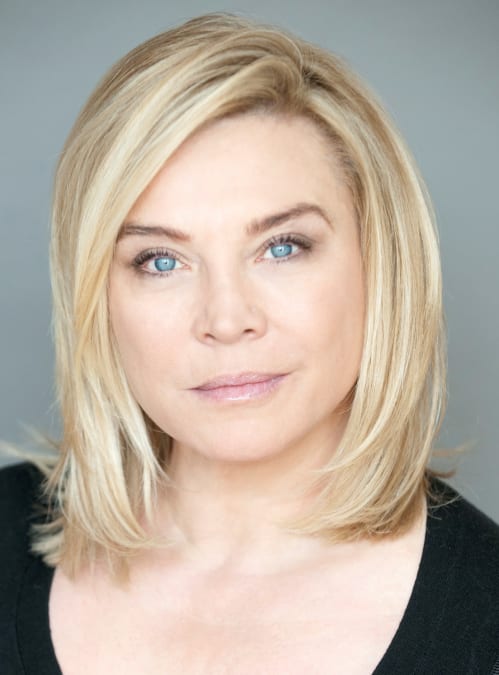
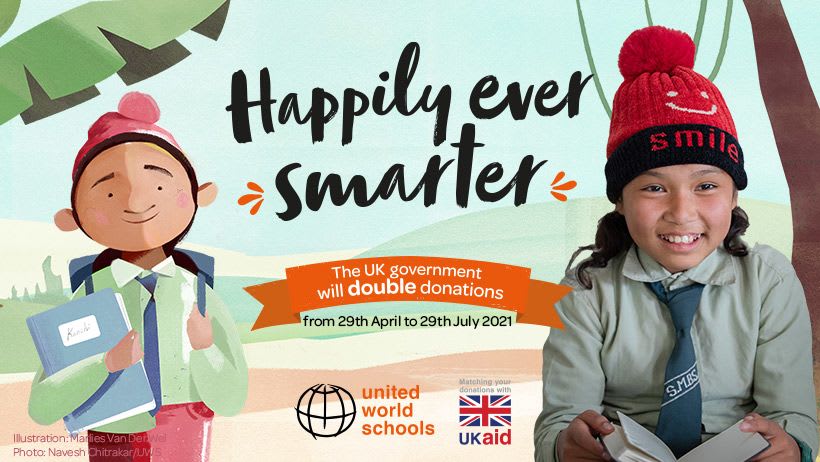
Match funding from the UK government will be used to help over 8,505 out of school children in some of the most remote areas in Nepal to go to primary school for the first time.
All donations will help marginalised children in remote communities to access life-changing education across Asia, so that they can live Happily Ever Smarter.
Together we can make going to school a reality for thousands of primary-school-age children, for the very first time in their lives.
